The National Academy of Sciences of the Republic of Korea (Korean: 대한민국학술원), is the senior national organization of distinguished Korean scientists and scholars. It was founded to promote learning and research in all areas of sciences by conferring membership and preferential treatment to those who have made outstanding contributions to the advancement of sciences and learning. The Academy consists of 150 Fellows who are selected by their peers for their contributions to the sciences and education.
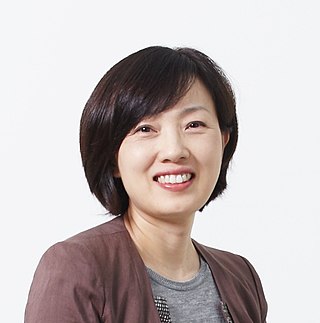
V. Narry Kim is a South Korean biochemist and microbiologist, best known for her work on microRNA biogenesis. Her pioneering studies have laid the groundwork for the biology of microRNA and contributed to the improvement of RNA interference technologies.

Ryoo Ryong FRSC is a distinguished professor of chemistry at KAIST in Daejeon, South Korea. He was the head of the Center for Nanomaterials and Chemical Reactions, an Extramural Research Center of the Institute for Basic Science. Ryoo has won a variety of awards, including the Top Scientist and Technologist Award of Korea given by the South Korean government in 2005. He obtained the KOSEF Science and Technology Award in 2001 for his work on the synthesis and crystal structure of mesoporous silica.

Yeom Han-woong is a South Korean physicist. A tenured professor at POSTECH, he has led several research centers for the university and from 2013 in collaboration with the Institute for Basic Science. He is a Fellow of the American Physical Society and has served as vice chairman of the Korean government's first science and technology advisory group for three consecutive terms. With more than 300 publications to his name, his research has been cited over 5,000 times giving him an h-index of 40 and i10-index of 125.

Cheon Jinwoo is the H.G. Underwood Professor at Yonsei University and the Director of the Center for Nanomedicine, Institute for Basic Science (IBS). As a leading chemist in inorganic materials chemistry and nanomedicine Cheon and his group research chemical principles for the preparation of complex inorganic materials. He has been a Clarivate Analytics Highly Cited Researcher both in the field of chemistry in 2014, 2015, 2016 and cross-field in 2018. He is a fellow of the American Chemical Society, Royal Society of Chemistry, and Korean Academy of Science and Technology, a senior editor of Accounts of Chemical Research and an editorial advisory board member of Journal of Materials Chemistry, Nano Letters and Materials Horizons.

Nam Chang-hee is a South Korean plasma physicist. Nam is specializing in the exploration of relativistic laser-matter interactions using femtosecond PW lasers. Currently he is professor of physics at Gwangju Institute of Science and Technology and director of the Center for Relativistic Laser Science as a part of the Institute for Basic Science (IBS).

Eunjoon Kim is a professor of KAIST and director of Center for Synaptic Brain Dysfunctions within the Institute for Basic Science (IBS). His current research focuses on molecular mechanisms underlying autism spectrum disorders and synaptic brain dysfunctions. With over 200 publications to his name, his research has been cited over 27,000 times giving him an h-index of 81. He graduated from Busan National University in 1986, received master's degree at KAIST in 1988, received PhD degree at Michigan State University in 1994, and worked at Harvard Medical School as a postdoctoral fellow during 1995-1996. His current research focuses on molecular organization of neuronal synapses and synapse dysfunction-related psychiatric disorders.
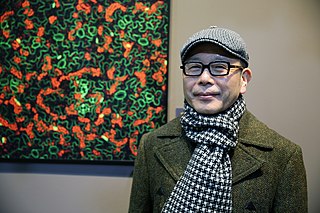
Hong Gil Nam is a South Korean biologist teaching in the Department of New Biology of Daegu Gyeongbuk Institute of Science and Technology and leading research as director of the Center for Plant Aging Research. His research interests include comparative aging in diverse kingdoms, including plant and animals, to reveal aging mechanisms among species, cross-kingdom interaction between plants and animals, and biochemistry at nano and micro levels. He is the founder and former director of the Biological Research Information Center, a member of the Korean Academy of Science and Technology, and has served on the editorial board in Molecular Plant since 2013.
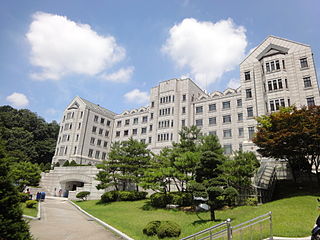
The R. K. Cho Economics Prize is awarded by Yonsei University in Seoul, South Korea to academics in the field of economics who have contributed to the development of scholarship and education. As of 2018, the prize includes a plaque, a medal, and a monetary award of ₩100 million.
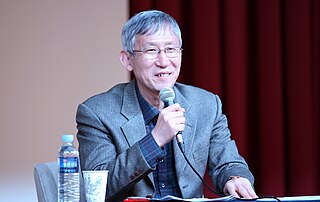
Sukbok Chang is a South Korean organic chemist. He is a distinguished professor in the Department of Chemistry at Korea Advanced Institute of Science and Technology (KAIST). He is also the director of the Institute for Basic Science (IBS) Center for Catalytic Hydrocarbon Functionalizations (CCHF). He was an associate editor on ACS Catalysis and has served on the editorial advisory boards of The Journal of Organic Chemistry, Journal of the American Chemical Society, and Accounts of Chemical Research. His major research interest is transition metal catalyzed C-H bond functionalization for the carbon-carbon bond and carbon-heteroatom bond formation.
The Korea Science Award is an award presented to South Koreans and Korean scientists working in domestic universities or research positions. It is currently jointly presented by the Ministry of Science and ICT and the National Research Foundation of Korea. Research achievements are limited to that of a single project conducted in Korea. Potential recipients go through a several stage review which includes consolation with foreign scholars.
The Asan Award in Medicine is an annual medical award presented by the Asan Foundation (ko). Not to be confused with their other prize, the ASAN Award, which is given for volunteer work, nor the Asan Memorial Poetry Prize given by the Asan Memorial Association in memory of Malayalam poet Kumaran Asan. Established in 2007, the Asan Award in Medicine is presented in the categories of Basic Medicine, Clinical Medicine, and Young Medical Scientists who are under the age of 40. For the first five years there was a singular laureate but now there is laureate for basic and clinical and up to three young scientists laureates.
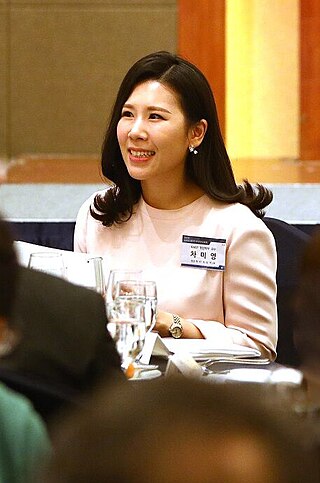
Cha Meeyoung, sometimes known as Mia, is an associate professor at KAIST in the School of Computing and a chief investigator in the Pioneer Research Center for Mathematical and Computational Sciences at the Institute for Basic Science. Her research focuses on network and data science with an emphasis on modeling, analyzing complex information propagation processes, machine learning-based computational social science, and deep learning. In June 2024, she will become the scientific director of the Max Planck Institute for Security and Privacy. She has served on the editorial boards of the journals PeerJ and ACM Transactions on Social Computing.
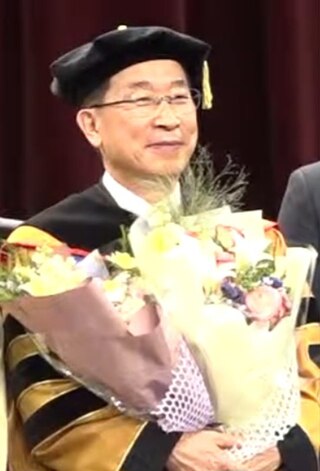
Kuk Young is a South Korean physicist, former physics professor and vice-provost of research of Seoul National University, distinguished professor of Ewha Womans University, and chairman of the Samsung Science and Technology Foundation. He is a fellow of the American Physical Society, Korean Academy of Science and Technology, Institute of Physics, Korean Physical Society, and Korean Vacuum Society. He has performed editor roles for the journals Nanotechnology, ACS Nano, and Solid State Electronics and was the fourth president of Daegu Gyeongbuk Institute of Science and Technology (DGIST).

Changjoon Justin Lee is an American neuroscientist specializing in the field of glioscience. He served as the Director of Center for Neuroscience at the Korea Institute of Science and Technology and later founded the WCI Center for Functional Connectomics as part of the World Class Institute Program. In 2015, he established the Center for Glia-Neuron Interaction before becoming co-director of the IBS Center for Cognition and Sociality and head of the Cognitive Glioscience Group in 2018. He has been on the editorial boards of the journals Molecular Brain and Molecular Pain and is a chief editor of Experimental Neurobiology.
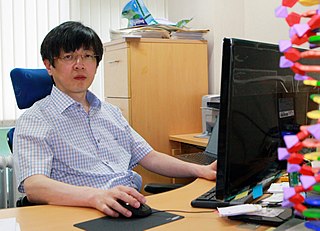
Kim Jin-Soo is a chemist, biologist, and entrepreneur. He was CEO and CSO, ToolGen, Inc., is a professor in the Department of Chemistry of Seoul National University and director of the Center for Genome Engineering. His research team has developed and improved several types of programmable nucleases, specifically zinc finger nucleases (ZFNs), TAL effector nucleases (TALENs), and RNA-guided engineered nucleases (RGENs). In 2018, he was a Clarivate Analytics Highly Cited Researcher in the cross-field category and in the biology and biochemistry category in 2019.

Park Jeong Young (Korean: 박정영), sometimes written as Park, Jeong Y., is a professor in the Department of Chemistry at KAIST and associate director at the Center for Nanomaterials and Chemical Reactions at the Institute for Basic Science. He is a member of the American Chemical Society and American Vacuum Society among others, an international committee member of Asian Science Camp, and has served on the editorial boards of Scientific Reports, Advanced Materials Interfaces, Journal of the Korean Physical Society, and New Physics.
Top Scientist and Technologist Award of Korea (Korean: 대한민국최고과학기술인상) is one of two annual awards given in South Korea by the Korean Federation of Science and Technology Societies with the other being a government award for contribution to science and technology promotion. The Top Scientist and Technologist Award of Korea was started in 2003 as the successor to the Science and Technology Award of Korea which was established in 1968. The award is to foster honor and pride and create an environment in which people can focus on research and development by discovering and encouraging scientists and engineers with outstanding achievements who can represent South Korea. While previously given to multiple individuals, from 2003 only person is selected for each cycle. Laureates receive the award and 300 million KRW cash prize.

Suh Pann-Ghill is a South Korean neuroscientist. He has served as a professor and vice president for research at UNIST and the third president of the Korea Brain Research Institute.

Kim Jae Kyoung is a biomedical mathematician and associate professor at KAIST in the Department of Mathematical Sciences and a chief investigator in the Pioneer Research Center for Mathematical and Computational Sciences at the Institute for Basic Science. His research focuses on mathematical biology and medicine, specifically the combination of nonlinear dynamics, the theory of stochastic processes, and computational science, to better understand disease mechanisms and develop relevant treatment strategies, including drug and digital medicine for sleep disorders.
















